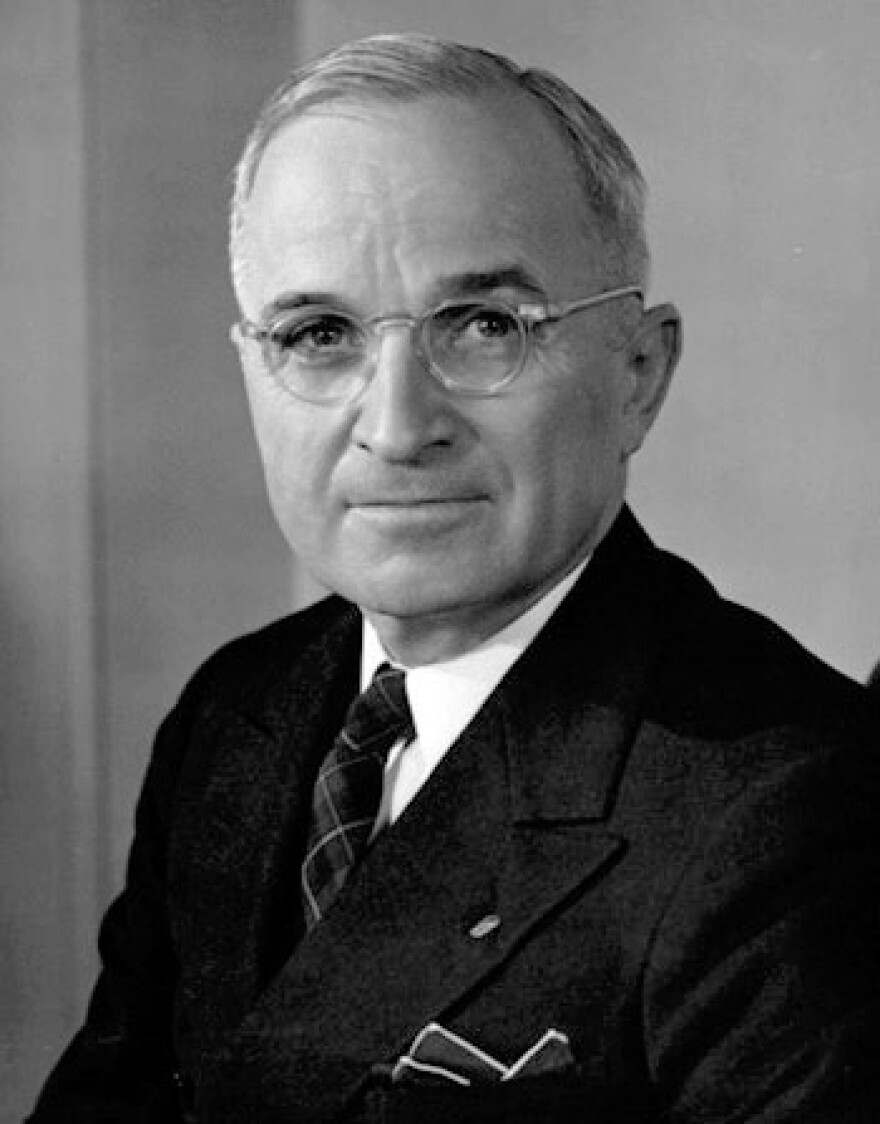This St. Louis on the Air program will be re-broadcast on Monday, May 30 at noon. You can listen live online here. It was initially aired on July 22, 2015.
During the summer and fall of 1948, President Harry S. Truman’s risky journey toward a second term turned out to be one of his greatest campaigning decisions.
After a 31,000-mile train ride across the country and 352 speeches during what’s known as his “Whistle Stop Tour,” Truman won the presidential election against then New York Governor Thomas Dewey.
Phil White, author of “Whistle Stop: How 31,000 Miles of Train Travel, 352 Speeches, and a Little Midwest Gumption Saved the Presidency of Harry Truman,” chronicles Truman’s trip.
With an approval rating in the red and southern states that had strong voting voices, Truman’s chances of a second term looked bleak. Feeling that the country’s morals were not solid, he centered his 1948 campaign on improving civil rights. Having served with men of color in World War I, Truman believed that freedoms enjoyed by white Americans should pertain to all.
Truman’s lack of charisma also threatened his campaign. The flaw caused him to have to create inventive ways of reaching the public.
“Taking it on his merit, or lack thereof, he was not a very good public speaker,” White explained. “When you compare him to the silky tones of Franklin D. Roosevelt, or Winston Churchill speeches, it just wasn’t working.”
Despite his imperfection, Truman’s campaign team would not give up. His publicist, a journalist named Charlie Ross, developed a plan to improve Truman’s appeal. The plan consisted of a cross-country train tour of campaigning in several cities called the “Whistle Stop Tour.”
During the trip, Truman would stop in each city and deliver a campaign speech from the back of the train. To make the journey more personal, Truman’s research division worked to gather information about each town before arrival, so that his speeches would pertain to local issues in that area.
“What [the research team] would do is come up with localized information that Truman could use such as if there was a flood in a local town, he could use that.” White said.
During his tour, Truman reached at least three million citizens, White said.
Another interesting feature of Truman’s 1948 campaign was that he had to pay radio networks to carry his campaign speeches. At one point, during Labor Day, he needed $50,000 for a network to cover his speech. Fearing that Truman would lose the vote of labor unions if the speech wasn’t aired, assistant secretary Oscar Chapman enlisted the help of Oklahoma Governor Roy Turner. However, the network cut the speech short due to insufficient funds.
With one trial after another, Truman’s “Whistle Stop Tour” hung on a limb. The campaign had run out of money.
Truman resorted to pleading for money from the public to continue the trip. Roy Turner stepped in once again, collaborating with his wealthy friends, who donated the funds to continue the campaign. Truman would go on to win the election.
Truman’s entire presidency was almost uncannily similar to his 1948 campaign trail in that it came with immense challenges. Some of the difficulties he encountered included taking on the presidency after the death of Roosevelt, corruption within his cabinet, and the two wars.
“When historians and political scientists who evaluate presidents look at Truman now, they see his presidency as an impressive presidency less so on domestic policy, but much more on foreign policy and his role as a leader,” said Peter Kastor, history professor at Washington University in St. Louis. “He faced enormously important decisions and in the long run, the decisions he made seemed to have been prudent ones. It’s hard to think of another president who inherited the office who faced as many challenges as he did.”
One of the most controversial decisions Truman faced during his entire presidency was dropping the atomic bomb on Hiroshima, Japan.
“It was certainly a very important [decision],” said Sam Rushay, an archivist for the Harry S. Truman Library. “It was a military weapon that he believed would end the war and save American lives, and he was willing to use whatever weapon or means at his disposal to do so.”
Other significant decisions during Truman’s terms include the Marshall Plan, the Truman Doctrine, and the creation of the Central Intelligence Agency.
“I think there is the tendency sometimes to reduce the Truman presidency to the [atomic] bomb,” Rushay said. “But, looking over the entire fabric of Truman’s presidency and the many numerous decisions that have had long-lasting impacts, I think it has to be placed within context.”
Listen to the audio to hear more on the discussion of Truman’s legacy.
St. Louis on the Air discusses issues and concerns facing the St. Louis area. The show is produced by Mary Edwards and Alex Heuer and hosted by veteran journalist Don Marsh. Follow us on Twitter: @STLonAir.


